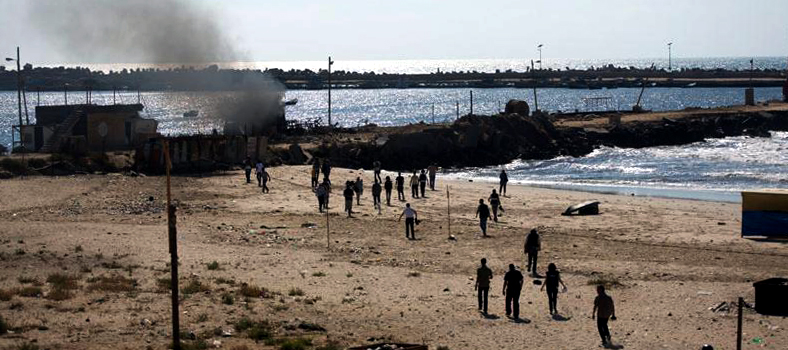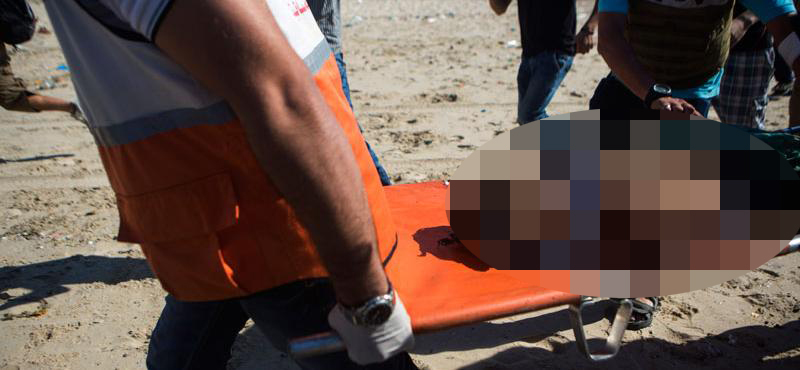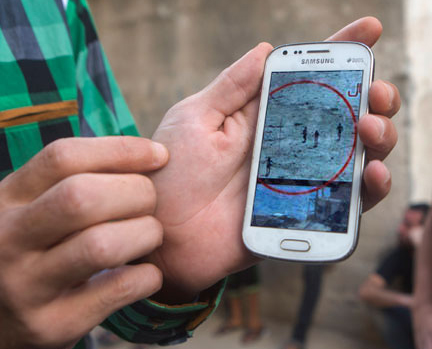Revealed: Israeli military launched missiles at kids playing on Gaza beach in 2014 without first identifying targets
The Israeli military launched missiles at a beach in the Gaza Strip during its 2014 offensive without first verifying that its targets were actually Palestinian children rather than combatants, according to investigatory materials that Adalah – The Legal Center for Arab Minority Rights in Israel and Al Mezan Center for Human Rights (Gaza) received from the Israeli military.
On 16 July 2014, during the military offensive in the Gaza Strip that Israel termed “Operation Protective Edge”, Israeli naval forces fired missiles that killed four children of the Bakr family – Ahed (10 years), Zakaria (10 years), Mohammed (11 years), and Ismail (10 years) – while they were playing soccer on Gaza City’s fishing beach. Six other civilians were also wounded in the missile attack, including four children from the same extended family.

Paramedics and media crews at the location minutes after the attack that killed the four Bakr children as they were playing on the beach. (Courtesy of Al Mezan)
According to testimony collected by Israeli military investigators from a soldier involved in the missile strike: “The only people entering [that area] are fisherman who stop at the shack located there that was attacked during the operation prior to this incident. The mooring area, at that time, was under maritime closure and there were no fishermen there. In our research, we always work on the assumption that there are only Hamas members there.”
Additional testimony collected by Israeli military investigators revealed that the Israeli military did not take any measures to ascertain whether the targets on the ground were civilians, let alone children, prior to intentionally directing the attacks against them.

Paramedics evacuating one of the Bakr children after the attack. (Courtesy of Al Mezan)
On 28 January 2018, Adalah and Al Mezan submitted their additional arguments against the Military Advocate General’s (MAG) decision to close the investigation into the incident.
The two organizations filed their additional arguments after receiving and reviewing very limited portions of the investigatory materials from the Israeli Military Police. In August 2015, the organizations filed an appeal to the MAG on behalf of the victims’ families demanding access to the investigatory materials and a reopening of the probe; more than two years of unreasonable and unjustified delays ensued before Israeli authorities responded by releasing heavily redacted material.
Adalah Attorney Muna Haddad stressed in the additional reservations that this failure to identify targets constitutes a severe violation of the principle of distinction between combatants and civilians during conflict, as mandated by international humanitarian law:
“The Israeli military was obligated to do everything feasible to verify that the individuals to be attacked were not civilians. Entry into a military area is not sufficient in order to [justify] attack and an attack of this nature is therefore a gross violation of the principle of distinction and of Israel’s responsibilities under international humanitarian law.”
In addition, Attorney Haddad emphasized that the Israeli strike was not one of urgent necessity and that the military could therefore have verified – in accordance with its legal obligations – whether its intended targets were civilians or combatants:
“The testimonies reveal that there were no Israeli soldiers in the area and there was no immediate danger posed to anyone, and there was therefore no urgency in carrying out the attack. It was possible to have obtained further intelligence on the nature of the targets in order to verify whether they were combatants or not.”
Nevertheless, Israeli military personnel involved in the incident displayed indifference to the possibility of targeting and harming civilians, including children, and decided to attack on the basis of unverified assumptions.

A member of the Bakr family showing a screen shot on his mobile phone showing the Bakr children running on the beach after the first missile was launched. (Courtesy of Al Mezan)
Adalah and Al Mezan again emphasized that the Israeli military’s investigation into the killing of the Bakr boys has failed to meet the standards of international humanitarian law and violates the universal principles of independence, effectiveness, promptness, impartiality and transparency. Testimonies were taken more than four months after the incident, and investigators – themselves members of the Israeli military – did not bother to gather testimonies from Palestinian eyewitnesses or any of the large numbers of foreign journalists who also personally witnessed the attack.
Additionally, the Israeli military refused to provide large sections of the investigatory materials to Adalah and Al Mezan attorneys.
- CLICK HERE to read a joint report by Adalah and Al Mezan: Gaza 3 Years On – Impunity Over Accountability [August 2017]
- CLICK HERE to watch Al Mezan's short documentary film on the killing of the Bakr children [Arabic with English subtitles]
- CLICK HERE to read the additional reservations [Hebrew]














